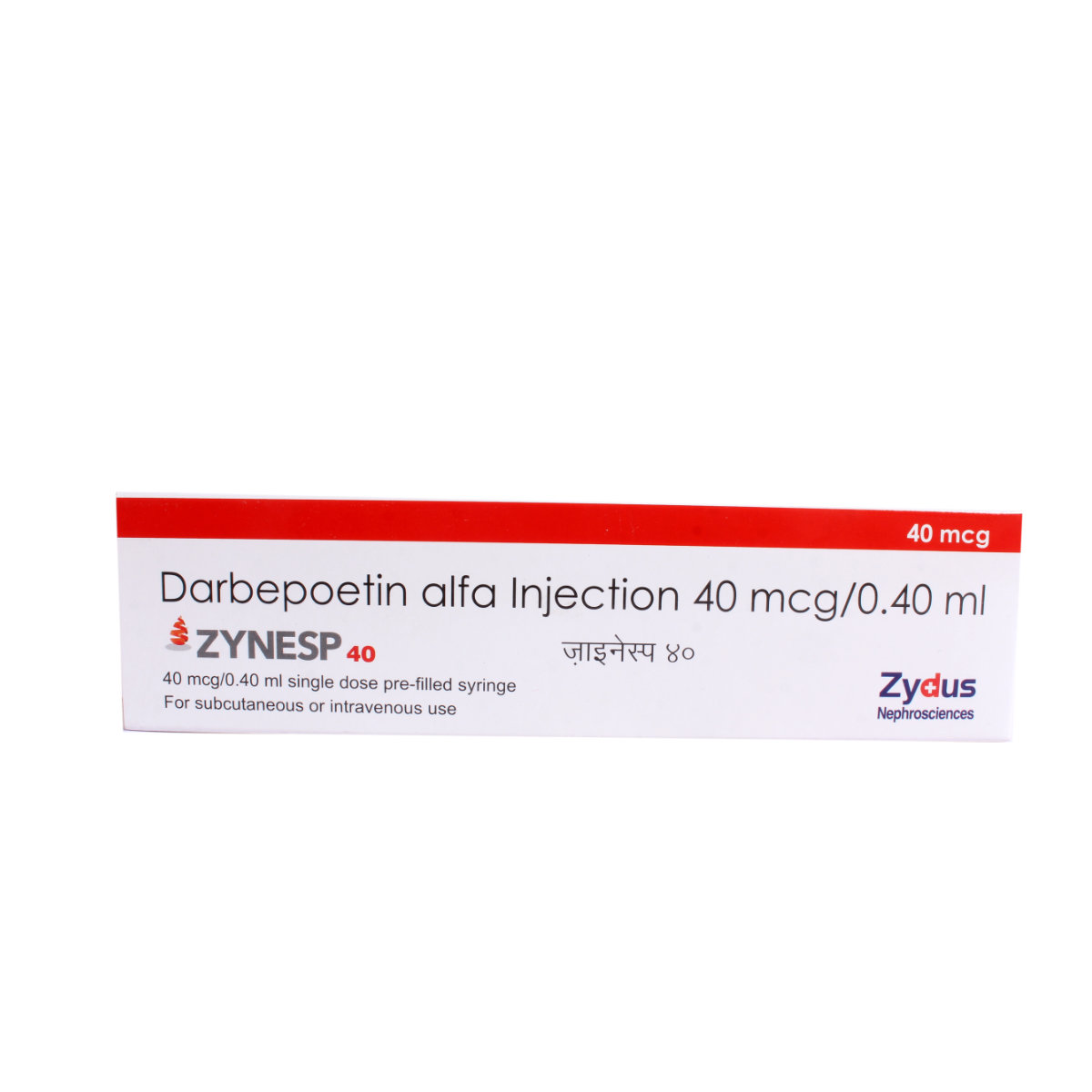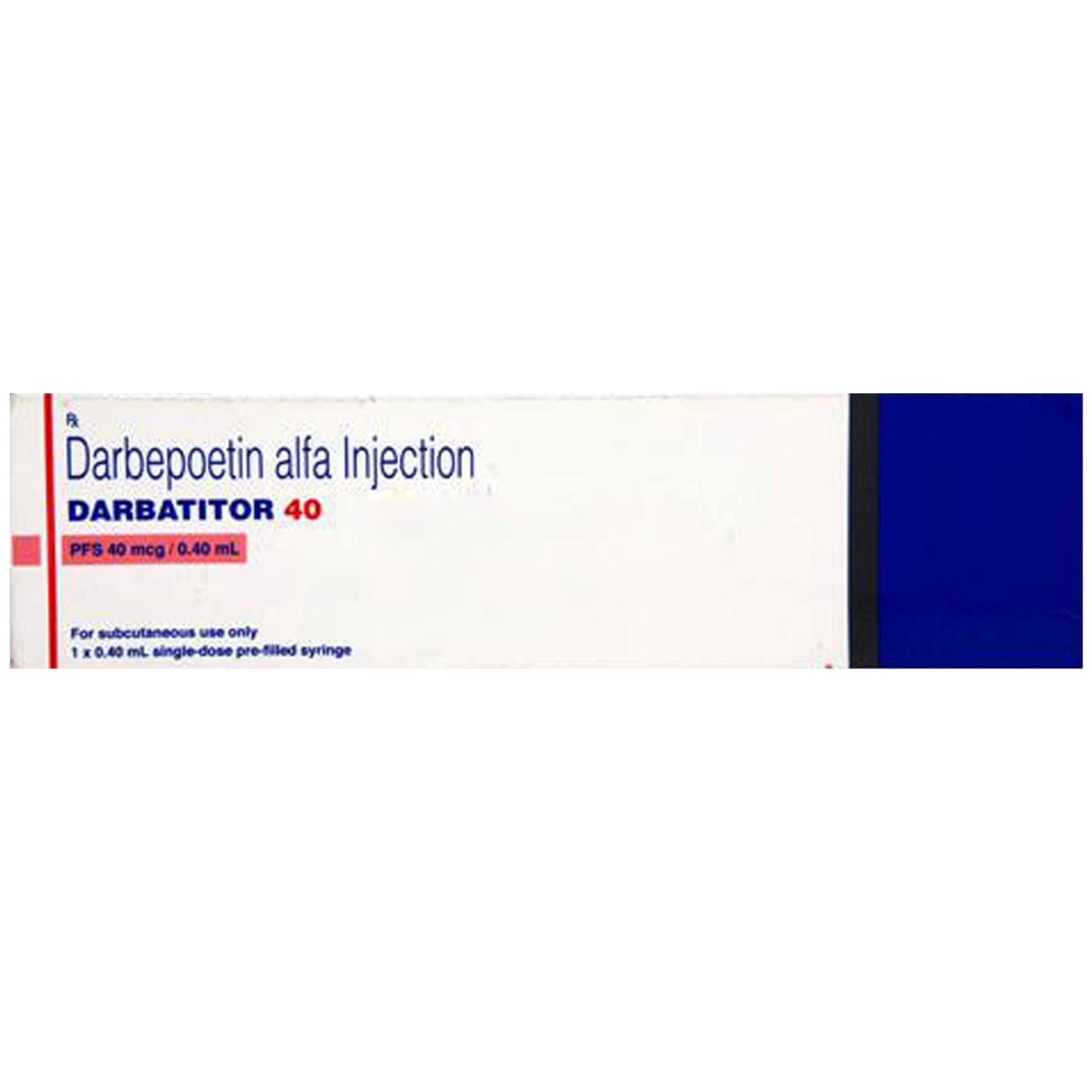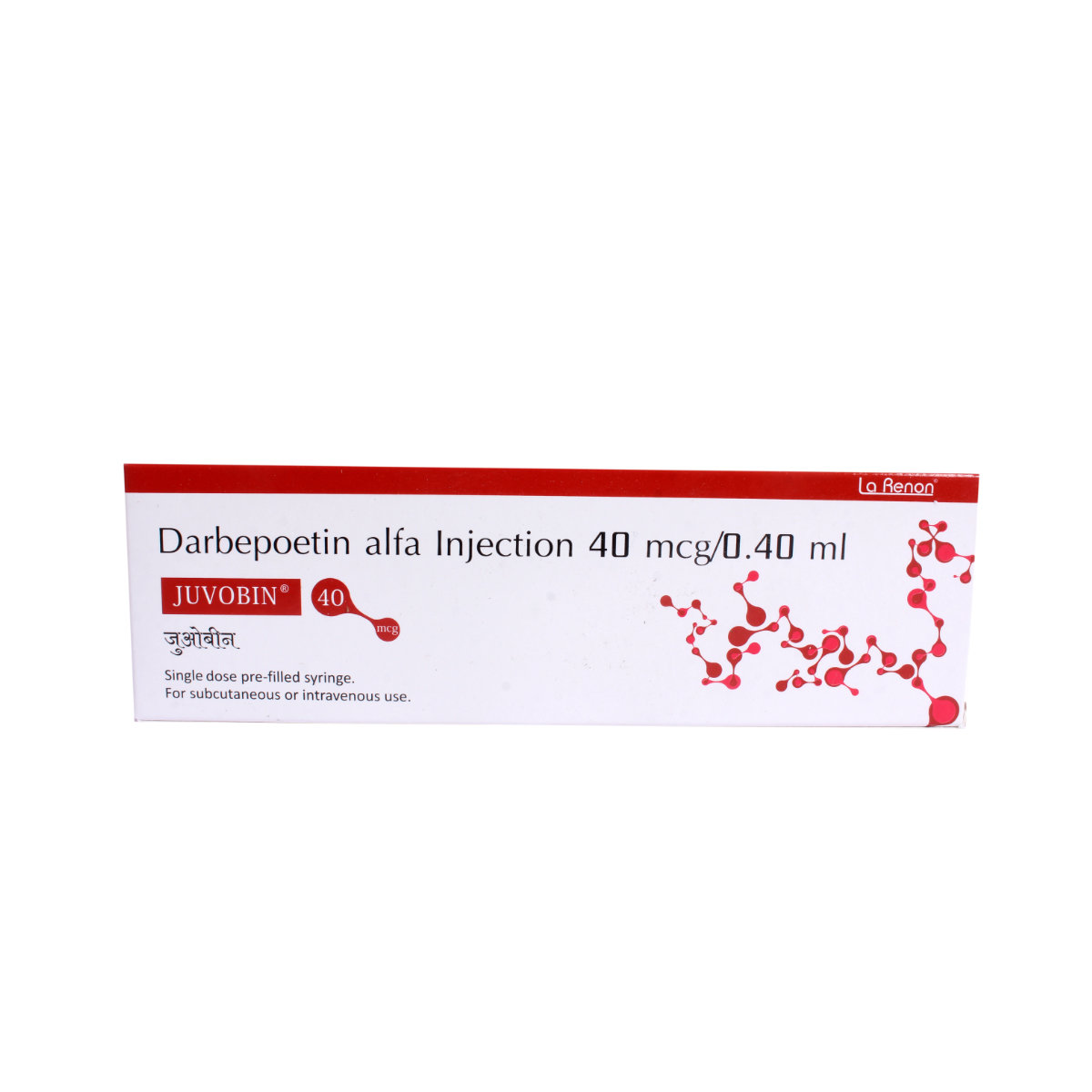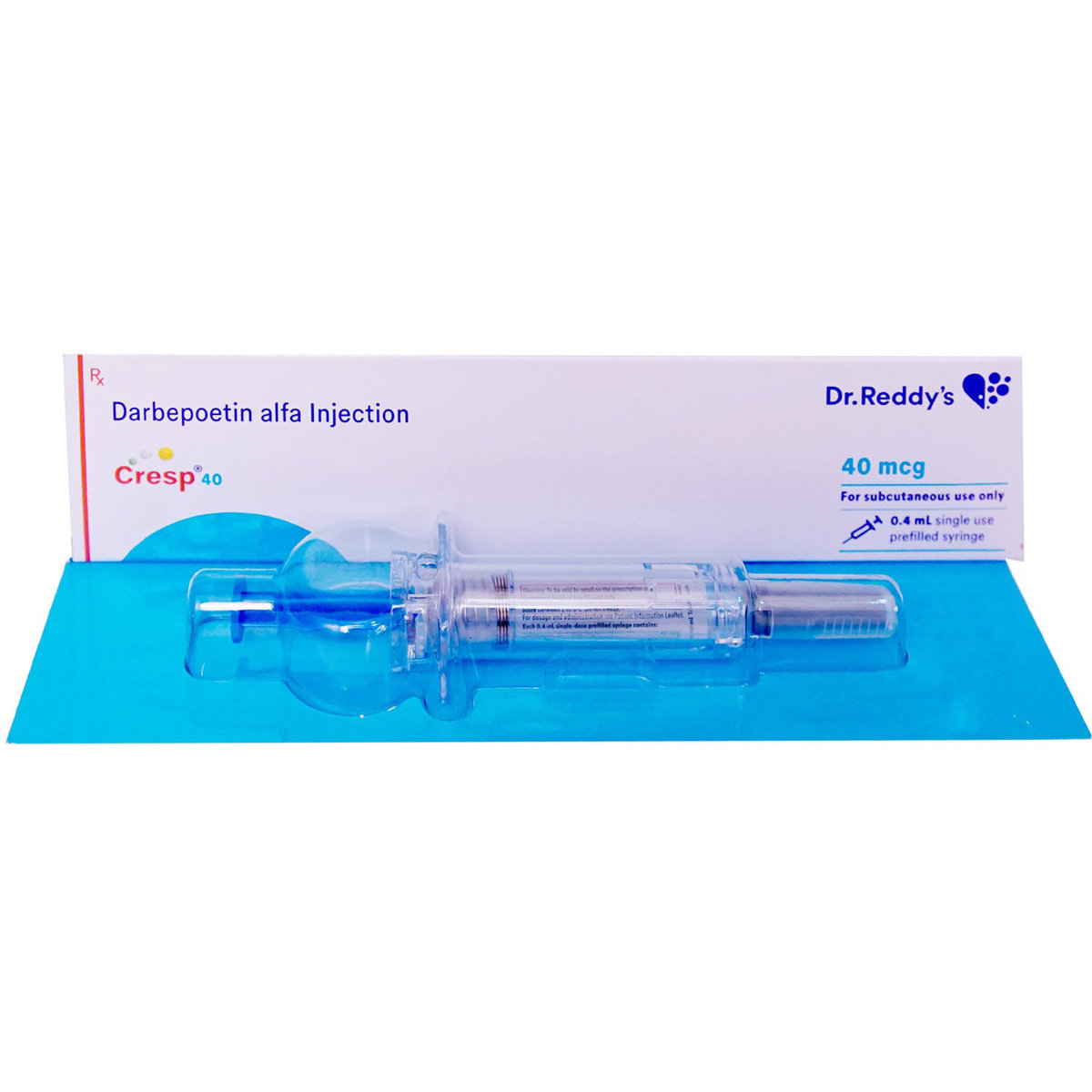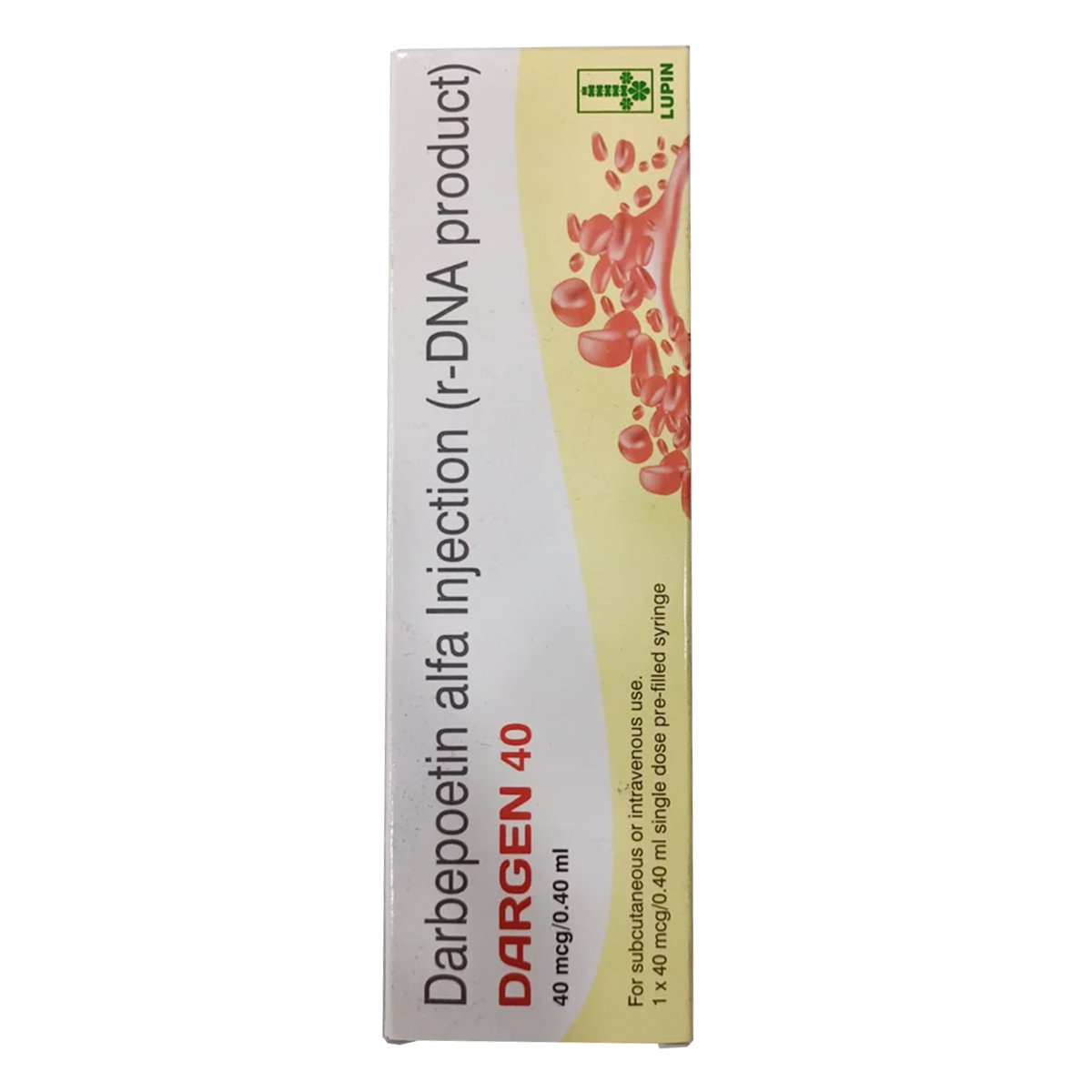Dpoetin 40mcg Injection 0.4 ml
MRP ₹3088
(Inclusive of all Taxes)
₹463.2 Cashback (15%)
Provide Delivery Location
Online payment accepted
 Prescription drug
Prescription drugWhats That
Composition :
Manufacturer/Marketer :
Consume Type :
Expires on or after :
Return Policy :
About Dpoetin 40mcg Injection
Dpoetin 40mcg Injection belongs to the class of medication called 'blood-forming agent' primarily used to treat anaemia (low red blood cell count) in person with long-term serious (chronic) kidney disease and persons receiving chemotherapy for some types of cancer (except for bone marrow or blood cells' cancer). Dpoetin 40mcg Injection helps to reverse anaemia and reduce the need for blood transfusion. Anaemia occurs when the body has a lower amount of red blood cells or haemoglobin. In chronic kidney disease, the kidney gets damaged and doesn't filter the blood, leading to anaemia.
Dpoetin 40mcg Injection contains a protein 'Darbepoetin alfa' which works by providing signals to the bone marrow to make more red blood cells. Dpoetin 40mcg Injection is a biologic response modifier and erythropoiesis-stimulating protein. In chronic kidney disease, when the kidney fails to produce sufficient 'erythropoietin protein' which aids in the formation of red blood cells, Dpoetin 40mcg Injection stimulates the production of this protein in the bone marrow.
Dpoetin 40mcg Injection will be injected by the healthcare provider. Do not self-administer. The most common side effects of Dpoetin 40mcg Injection are shortness of breath, cough, low blood pressure during dialysis, headache, body aches, diarrhoea, injection site pain and abdominal pain. Most of these sides effects of Dpoetin 40mcg Injection do not require medical attention and gradually resolve over time. However, if the side effects are persistent, reach out to your doctor.
If you have uncontrolled/untreated high blood pressure or red cell aplasia (a type of anaemia) due to darbepoetin alfa or epoetin alfa, please inform your doctor before taking Dpoetin 40mcg Injection to avoid any complications. Also, mention all the other medications you are taking to affect the way Dpoetin 40mcg Injection works. Inform your doctor immediately, if you feel weak, lightheaded, tired, or short of breath, or if your skin looks pale as it may be signs that the body has stopped responding to Dpoetin 40mcg Injection .
Uses of Dpoetin 40mcg Injection
Directions for Use
Key Benefits
Dpoetin 40mcg Injection is a human-made form of naturally occurring erythropoiesis-stimulating protein or erythropoietin (a hormone produced by the kidney's specialized cells and is responsible for protecting red blood cells against destruction and also stimulates the cells of bone marrow to produce more amount of red blood cells). Deficiency of erythropoietin happens when a person is suffering from chronic kidney diseases, which in turn cause low red blood cells count causing anaemia. This medicine is primarily indicated for treating anaemia (low red blood cell count) in persons with long-term serious (chronic) kidney disease and persons receiving chemotherapy for some types of cancer except for bone marrow or blood cells' cancer. Dpoetin 40mcg Injection contains a protein 'Darbepoetin alfa' which works by providing signals to the bone marrow to make more red blood cells.
Storage
- Inform your doctor about the nausea and discuss possible alternatives to the medication or adjustments to the dosage.
- Divide your daily food intake into smaller, more frequent meals to reduce nausea.
- Opt for bland, easily digestible foods like crackers, toast, plain rice, bananas, and applesauce.
- Avoid certain foods that can trigger nausea, such as fatty, greasy, spicy, and smelly foods.
- Drink plenty of fluids, such as water, clear broth, or electrolyte-rich beverages like coconut water or sports drinks.
- Use ginger (tea, ale, or candies) to help relieve nausea.
- Get adequate rest and also avoid strenuous activities that can worsen nausea.
- Talk to your doctor about taking anti-nausea medication if your nausea is severe.
- Record when your nausea occurs, what triggers it, and what provides relief to help you identify patterns and manage your symptoms more effectively.
- Preventing Vomiting (Before it Happens)
- Take medication exactly as prescribed by your doctor. This can help minimize side effects, including vomiting.
- Having a small meal before taking your medication can help reduce nausea and vomiting.
- Talk to your doctor about taking anti-nausea medication along with your prescribed medication.
- Managing Vomiting (If it Happens)
- Try taking ginger in the form of tea, ale, or candy to help alleviate nausea and vomiting.
- What to Do if Vomiting Persists
- Consult your doctor if vomiting continues or worsens, consult the doctor for guidance on adjusting your medication or additional treatment.
- Rest well; get enough sleep.
- Eat a balanced diet and drink enough water.
- Manage stress with yoga and meditation.
- Limit alcohol and caffeine.
- Physical activities like walking or jogging might help boost energy and make you feel less tired.
- Report to Your Doctor: Inform your doctor about the muscle pain, as they may need to adjust your medication.
- Stretch Regularly: Gentle stretching can help relieve muscle pain and stiffness.
- Stay Hydrated: Adequate water intake supports muscle health by removing harmful substances and maintaining proper muscle function.
- Warm or Cold Compresses: Apply cold or warm compresses to the affected area to reduce pain and inflammation.
- Rest and Relaxation: Adequate rest helps alleviate muscle strain, while relaxation techniques like deep breathing and meditation can soothe muscle tightness, calm the mind, and promote relief from discomfort.
- Gentle Exercise: Participate in low-impact activities, such as yoga or short walks, to improve flexibility, reduce muscle tension, and alleviate discomfort.
- Consult a physician: If your symptoms don't improve or get worse, go to the doctor for help and guidance.
- Tell your doctor immediately if you experience shortness of breath after taking medication.
- Your doctor may adjust the medication regimen or dosage or give alternative medical procedures to minimize the symptoms of shortness of breath.
- Monitor your oxygen levels and breathing rate regularly to track changes and potential side effects.
- For controlling stress and anxiety, try relaxation techniques like deep breathing exercises, meditation, or yoga.
- Make lifestyle changes, such as quitting smoking, exercising regularly, and maintaining a healthy weight.
- Seek emergency medical attention if you experience severe shortness of breath, chest pain, or difficulty speaking.
- Follow up regularly with your doctor to monitor progress, adjust treatment plans, and address any concerns or questions.
- Hydrate your body: Drink enough water to prevent dehydration and headaches.
- Calm Your Mind: Deep breathing and meditation can help you relax and relieve stress.
- Rest and Recharge: Sleep for 7-8 hours to reduce headache triggers.
- Take rest: lie down in a quiet, dark environment.
- Cold or warm compresses can help reduce tension.
- Stay Upright: Maintain good posture to keep symptoms from getting worse.
- To treat headaches naturally, try acupuncture or massage therapy.
- Over-the-counter pain relievers include acetaminophen and ibuprofen.
- Prescription Assistance: Speak with your doctor about more substantial drug alternatives.
- Severe Headaches: Seek emergency medical assistance for sudden, severe headaches.
- Frequent Headaches: If you get reoccurring headaches, consult your doctor.
- Headaches with Symptoms: Seek medical attention if your headaches include fever, disorientation, or weakness.
- Inform your doctor about the medication you're taking and the UTI symptoms you're experiencing.
- Your doctor may adjust your medication regimen or consider alternative medications or dosages that may reduce the risk of UTIs.
- Drink plenty of water (at least 8-10 glasses a day) to help flush out bacteria. Avoid sugary drinks and caffeine, which can exacerbate UTI symptoms.
- Urinate when you feel the need rather than holding it in. This can help prevent bacterial growth and reduce the risk of UTIs.
- Consider cranberry supplements: Cranberry supplements may help prevent UTIs by preventing bacterial adhesion.
- Monitor UTI symptoms and report any changes to your doctor.
- If antibiotics are prescribed, take them as directed and complete the full course.
Drug Warnings
Dpoetin 40mcg Injection can enhance the risk of serious heart problems including heart attack so tell your doctor immediately if you notice shortness of breath, sudden numbness or weakness, chest pain, or trouble speaking or understanding. This medicine may also shorten survival time in some people with certain types of cancer. Inform your doctor before taking Dpoetin 40mcg Injection if you have heart disease, high blood pressure, kidney disease, stroke, heart attack, blood clot, seizure, or latex allergy. Do not take Dpoetin 40mcg Injection if you are pregnant or breastfeeding unless prescribed by the doctor. Dpoetin 40mcg Injection may affect a person's ability to drive as it may cause convulsion during initial days of treatment, so a person taking Dpoetin 40mcg Injection should avoid driving or operating any machine. Dpoetin 40mcg Injection should not be given to children below 12 years of age, as safety and effectiveness have not been established. Avoid consuming alcohol along with Dpoetin 40mcg Injection as it could lead to increased dizziness and sleepiness.
Drug-Drug Interactions
Drug-Drug Interactions
Login/Sign Up
Combining Dpoetin 40mcg Injection 0.4 ml with Carfilzomib can increase the risk of blood clots.
How to manage the interaction:
Although there is a possible interaction between Carfilzomib and Dpoetin 40mcg Injection 0.4 ml, you can take these medicines together if prescribed by your doctor. However, if you experience chest pain; shortness of breath; difficulty breathing; coughing up blood; sudden loss of vision; pain, redness, or swelling in an arm or leg; and numbness or weakness on one side of the body, contact a doctor immediately. Do not stop using any medications without consulting a doctor.
Taking thalidomide together with Dpoetin 40mcg Injection 0.4 ml may increase the risk of blood clots.
How to manage the interaction:
Although there is a possible interaction between Thalidomide and Dpoetin 40mcg Injection 0.4 ml, but it can be taken if your doctor has advised it. However, if you experience chest pain shortness of breath, difficulty breathing, coughing up blood, sudden loss of vision, pain, redness, or swelling in an arm or leg; and numbness or weakness on one side of the body, contact a doctor immediately. Do not stop using any medications without consulting a doctor.
Taking Dpoetin 40mcg Injection 0.4 ml with Lenalidomide can increase the risk of blood clots.
How to manage the interaction:
Although there is an interaction between lenalidomide and Dpoetin 40mcg Injection 0.4 ml, it can be taken if your doctor has advised it. However, if you experience chest pain, shortness of breath, difficulty breathing, coughing up blood, sudden loss of vision, pain, redness or swelling in an arm or leg, and numbness or weakness on one side of the body, contact your doctor immediately. Do not discontinue any medications without consulting a doctor.
Taking Dpoetin 40mcg Injection 0.4 ml with Pomalidomide can increase the risk of dangerous blood clots.
How to manage the interaction:
Although there is a possible interaction between Pomalidomide and Dpoetin 40mcg Injection 0.4 ml, you can take these medicines together if prescribed by a doctor. However, If you experience chest pain, difficulty breathing, coughing up blood, sudden loss of vision, pain, redness, or swelling in an arm or leg, or numbness or weakness on one side of the body, consult a doctor immediately. Do not discontinue any medications without a doctor's advice.
Drug-Food Interactions
Drug-Food Interactions
Login/Sign Up
Diet & Lifestyle Advise
- Limit the consumption of fluids, salt, potassium, phosphorous, and other electrolytes.
- Eat a low-protein diet, and get enough calories from the foods if you are losing weight.
- Eat foods that are high in vitamin B12, iron, and folic acid can fulfil the deficiencies of happed in kidney disease.
- Include a little number of healthy fats in your diet that give you enough energy to be active during the day; however, try to limit fats that make you fatty. Try to include olive oil, peanut oil, and corn oil into your diet.
- Rest well, get plenty of sleep.
- Avoid smoking and alcohol consumption.
- Using essential oils for massages can help increase circulation.
Side Effects of Dpoetin 40mcg Injection
- Shortness of breath
- Cough
- Hypotension (low blood pressure)
- Headache
- Body aches
- Diarrhoea
- Injection site pain
- Abdominal pain (stomach pain)
Habit Forming
Therapeutic Class
All Substitutes & Brand Comparisons
RX
Zynesp 40 Injection 1's
Zydus Cadila
₹2612.5
(₹2142.3 per unit)
66% CHEAPERRX
Out of StockDarbatitor 40 Injection
Torrent Pharmaceuticals Ltd
₹2741.5
(₹2248.03 per unit)
64% CHEAPERRX
Out of StockActorise 40 Injection 1's
Cipla Ltd
₹2928
(₹2400.96 per unit)
62% CHEAPER
Drug-Diseases Interactions
Drug-Diseases Interactions
Login/Sign Up
FAQs
Drug-Drug Interactions Checker List
- THALIDOMIDE
- CYCLOSPORINE
- CAPTOPRIL
Special Advise
- Certain diagnostic tests like Complete blood count (CBC) can help check the count of red blood cells.
- Have regular haemoglobin tests to check whether there is an improvement in the level of red blood cells after taking Dpoetin 40mcg Injection or not.
Disease/Condition Glossary
Anaemia: It occurs when the body has a lower amount of red blood cells or haemoglobin than normal haemoglobin (iron-rich the protein responsible for allowing red blood cells to carry more oxygen from the lungs to the rest of the body). In chronic kidney disease, the kidney gets damaged and doesn't filter the blood, leading to anaemia. Symptoms of anaemia in chronic kidney disease include fatigue or tiredness, shortness of breath, ashen skin, weakness, body aches, chest pain, dizziness, fainting, fast or irregular heartbeat, headache, sleep problems, and trouble in concentrating.

Have a query?
Alcohol
Safe if prescribed
Avoid consumption of alcohol while taking Dpoetin 40mcg Injection as it may increase dizziness and sleepiness.
Pregnancy
Consult your doctor
Avoid taking Dpoetin 40mcg Injection if you are pregnant unless prescribed by a doctor as Dpoetin 40mcg Injection is a pregnancy category C drug. Please consult your doctor if you have any concerns regarding this, your doctor will prescribe only if the benefits outweigh the risks.
Breast Feeding
Consult your doctor
Consult your doctor before taking Dpoetin 40mcg Injection ; your doctor will decide whether Dpoetin 40mcg Injection can be taken by breastfeeding mothers or not.
Driving
Safe if prescribed
Dpoetin 40mcg Injection causes convulsions (seizures), especially during the initial months of treatment. So, it is better not to drive or operate machinery unless you are alert.
Liver
Consult your doctor
Dose adjustment may be needed in patients with liver impairment. Please consult your doctor if you have a liver impairment or any concerns regarding this.
Kidney
Consult your doctor
Dose adjustment may be needed in patients with kidney impairment. Please consult your doctor if you have kidney impairment or any concerns regarding this.
Children
Safe if prescribed
Dpoetin 40mcg Injection should not be given to children as the safety and efficacy have not been established.




